Section 16
Notes
16.1 Fundamentals
16.2 Print Reference Marks
16.3 Emphasis Used to Identify Reference Marks
16.4 Notes without a Reference Mark
16.5 Notes
16.6 Gloss Notes in Foreign Language Texts
16.7 Miscellaneous Notes Issues
16.8 Notes in Tables and Columned Material
16.9 Endnotes
16.10 Heavily Annotated Materials
16.11 Keying Technique for Marginal Labels
16.12 Samples
Note: There are unique situations for specific types of notes, such as tables and gloss notes in foreign language texts. (See Formats, §16.5.)
16.1.4 The print explanatory notes may be located:
a. At the foot of the page.
b. In the margin.
c. Between lines of narrative text.
d. In columns facing the narrative text.
e. On a page facing the narrative text.
f. Immediately above or below columned or tabular material.
g. In a note section, either at the end of each chapter or at the back of the book.
h. Online, with a URL provided in print. In this case, the URL is transcribed, but the transcriber is not responsible for putting the actual notes in the braille edition.
a. At the end of the print page, separated from text by a separation line.
b. Before or within tabular material.
c. At the end of the chapter or volume.
d. In a separate volume for heavily annotated text.
Asterisk "9
Dagger @,?
Double Dagger @,]
Superscripted number 1 ;9#a
Superscripted letter b ;9b
Superscripted hollow dot ;9"0
a. Place the reference mark as shown in print, either before or after the word or phrase being referenced.
b. List all reference marks used, along with the print symbols they represent, on the Special Symbols page.
c. Asterisks, daggers, and double daggers that appear raised from the baseline are not considered to be in the superscript position. (See UEB, §3.3.1, Asterisk, Dagger, and Double Dagger.) Retain the superscript format for all other symbols.
Example 16-1: Book with Asterisk Reference Mark

,hamlet"9
"9,o!llo
Example 16-2: Hollow Dot Reference Mark with Punctuation
"<craft;9"0">
craft;9"04
Example 16-3: Dagger Reference Mark with a Dash
,n[ is ! "t = all brave m5 to fly to
,m>s@,?,-!n come home4
Example 16-4: Numbered and Lettered Notes
script;9#a or libretto;9a
a. Follow print when emphasis is used to identify words or phrases with reference notes, e.g., all footnotes are underlined, blue print represents vocabulary, and highlighting represents glossary notes.
b. When it is clear that one type of emphasis indicates notes, explain this in a transcriber's note. Sample:
All of the bold words in this volume have reference notes associated with them.
Example 16-5: Reference Indicated by Underlining

⠀⠀⠀⠀⠀⠀@.<,all "ul9$ ^ws 9 ! passage 2l h
⠀⠀⠀⠀associat$ notes4@.>
,telema*us' _1fr5zy /ruck "s"o z
⠀⠀funny1
& soon ! :ole room ro>$ ) lau<t]
⠀⠀at hm1
s t all t5.n pass$4 444 #agj
a. Some notes may appear in the margin, alongside the referenced text, using no print symbol or emphasis.
b. Insert the word "note", enclosed in transcriber's note indicators, after the point of reference in the text.
c. The embedded note must be on the same line as at least one word or phrase to which it applies.
Note: Do not confuse marginal notes with sidebars. (See Formats, §12, Sidebars.)
Example 16-6: Note without a Print Reference Mark
,t float+ /uff is call$ slag4 @.<note@.>
,! slag is !n skimm$ (f4
a. Separate notes from text by a note separation line "333333 (5, 25, 25, 25, 25, 25, 25) across seven cells. The separation line cannot be on the last line of the braille page.
b. Insert a blank line before a note separation line only when the blank line is required by other formats, such as the end of a list. Exception: To reinforce a change in context, insert a blank line before the page change indicator when the text after the page change indicator begins in the same cell as note runovers. Leave line 1 of the following braille page blank if the note ends on line 25 and the text following the note begins in the same cell as the note runover.
c. List notes in the order in which they appear in the text. Do not group them by symbol or typeform.
d. Follow print for the use of reference marks. This may result in different marks being used at the point of reference within text and before the corresponding footnote. Do not add a reference mark if one is not used in print. Use 1-3 margins; for additional paragraphs in a note, use 5-3 margins. Note: Do not repeat transcriber-defined indicators before notes when there are no print reference marks. (See Formats, §16.3b.)
e. Use the entire width of the braille line for notes.
f. Retain font attributes unless all notes using the same reference mark are entirely emphasized. Do not retain font attributes for line numbers.
g. Notes may be separated by a title/heading or a blank line when there are multiple titles with separate note references on one print page. Use cell-5 headings for the titles/headings.
h. Do not insert a blank line between a note separation line and a title or heading. (See Sample 16-2: Notes with Headings on page 16-18.)
i. Notes in tables are discussed in Formats, §16.8.
Example 16-7: Note Placement

⠀⠀8,i "k,-t's :at ,i'm say+,-! old
/ories ab ! ka'ts9a _s@,? & ,yell[
,woman c't m1n u40
⠀⠀444
"333333
@,?^1ka'ts9a ^1_s3 ,a m.ta9 _s ( !
⠀⠀,laguna ,pueblo ,9dians4
⠀⠀⠀⠀⠀⠀⠀⠀⠀⠀⠀⠀⠀⠀⠀⠀⠀⠀⠀⠀⠀⠀⠀⠀⠀⠀⠀⠀⠀⠀⠀⠀⠀⠀⠀⠀⠀⠀⠀⠀
------------------------------------#gbc
⠀⠀,text
Example 16-8: Note with Range of Line Numbers

^1,juliet4 ,n pr\d y h1 b ?ank;l t
⠀⠀⠀⠀y h4
⠀⠀,pr\d c ,i n"e 2 ( :at ,i hate1 #afe
⠀⠀,b ?ank;l ev5 = hate t is m1nt
⠀⠀⠀⠀love4 @.<note@.>
"333333
#afd-#aff ,i'm n pl1s$1 b ,i am grate;l
⠀⠀= yr 9t5;ns4

@#1,pr$aci\s1 fi]ce1 secretive1 maje/ic1
& ev5 wise >e adjectives t describe !
[l4
"333333
^1pr$aci\s3 "*i/ic ( a pr$ator
------------------------------------#abc
444
a. Place gloss notes in foreign language materials on the line following the material to which the note applies.
b. Use 7-5 margins and follow print for any reference marks used.
c. If no print reference mark is used, insert an embedded transcriber's note following the point of reference within the text.
Example 16-10: Two Unmarked Notes on a Numbered Print Line

,brutus3 ,romans1 @.<note@.> #ad
⠀⠀c.trym51 @.<note@.> & lov]s6 ,he>
⠀⠀me = my cause1 & 2 sil5t1 t y #ae
⠀⠀may he>3 2lieve me4
"333333
#ad ,romans3 citiz5s ( ,rome
#ad c.trym53 ,italians
Example 16-11: Two Indicators at Same Reference Point

,! seme/] 0 2g9n+ ) a flurry (
activities4 ,all ! /ud5ts 7 preo3upi$ )
! details ( ! syllabus@,?@,] t 0
4sem9at$ by ! pr(essor at ! op5+ class4
"333333
@,?.1syllabus3 !⠀subject /udi$ = a
⠀⠀"picul> c\rse
@,].1syllabus3 a summ>y \tl9e ( a c\rse
⠀⠀( /udy
Example 16-12: Note with Pronunciation

⠀⠀⠀⠀⠀⠀@.<,all "ul9$ ^ws 9 ! passage 2l h
⠀⠀⠀⠀footnotes4@.>
⠀⠀,! build+ _h a fe/ive air on ! \tside
t 3tra/$ ) xs 9n] _1/aid;s4 ,ll by ll1
,juan 0 absorb$ by 8 job1 & he felt at
p1ce s9ce he 0 do+ "ey?+ he cd to get 8
lr = ,m>iana4
"333333
^1/aid;s "</@-ad^.bn@+is"> ;n4 a quiet1
⠀⠀(t5 /rait-lac$ dign;y
------------------------------------#ahh
444
a. Transcribe the note on the current page using 1-5 or 1-7 margins, depending on the number of references included in the note. Use a nested list format if more than two additional levels of references are included. The nested list format for notes is used only on these pages. Use 1-3 margins for notes on all other pages.
b. Transcribe the note referencing the first note using 3-5 or 3-7 margins, depending on the number of notes.
c. Use 5-7 margins for a note referencing the second note.
d. Include both page location information and reference marks, when given.
Note: Do not repeat a referenced note in a volume of endnotes, where notes are transcribed exactly as written. (See Sample 16-6: Repeated Note on page 16-23.)
a. An agency may request that notes be provided in a separate volume(s) when a book has text and notes on facing pages. In this situation, use combined page numbers in both volumes of text and notes. Indicate that the notes are in a separate volume on the Transcriber's Notes page. Sample:
The text and the notes to the text are in separate volumes.
b. The following is an example of the volume and page numbering for the individual volumes. The text is in the first volume, with notes in the following volume.
Volume 3
Braille pages t1-t5 and 1-67
Print pages 45-a70
Volume 4
Braille pages t1-t5 and 1-55
Print pages 45-a70
a. Place notes before tables as, in most situations, they need to be read before reading the table to understand the entries in the table.
b. Insert a transcriber's note before the table. Sample:
Note(s) in the table below.
c. Do not include the note(s) within the transcriber's note.
d. Place a blank line after the transcriber's note and then insert the reference note(s).
e. Use 1-3 margins for all notes.
f. Begin each note with the appropriate reference mark, followed by the note on the same line.
g. Do not leave blank lines between notes.
h. Other transcriber's notes follow the reference note(s).
(See Sample 16-9: Note in Column Entry on page 16-27.)a. Use 7-5 margins for all notes.
b. Do not leave a blank line between notes.
c. Listed format: Insert the note on the next line after the completion of the cell entry.
d. Linear format: Insert the note on the next line after the completion of the entire row.
e. Stairstep format: Insert the note on the next line after the completion of the cell entry.
f. A reference mark may be included in a keyed transcriber's note. Insert the note after the completion of the transcriber's note explaining the key.
(See Sample 16-10: Notes in a Listed Table on page 16-28.)a. Follow print for the placement of endnote sections at the end of each chapter.
b. Endnotes at the end of a book generally are divided and placed at the end of the volume in which the references appear.
c. Extensive endnote sections may be placed in a separate volume. This transposition of endnotes must be mentioned on the Transcriber's Notes page in each volume. Sample:
The endnotes to the text are in a separate volume.
Example 16-13: Extensive Notes in a Separate Volume (Print Only)
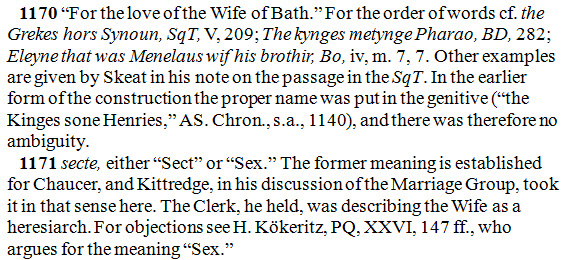
a. Begin an endnote section on a new braille page.
b. Insert the heading NOTES if the text does not include a heading at the beginning of the note section. Enclose it in transcriber's note indicators, on line 1 (line 3 if a running head is used).
c. Use 1-3 margins for each endnote.
d. Do not add print page numbers to the notes if they do not appear in print.
e. Before the note section in each volume, repeat lists of abbreviations for book/magazine titles referred to in the endnotes. List the abbreviations using 1-3 margins and follow print for punctuation, capitalization, and font attributes. Also follow print for the capitalization and use of font attributes for the abbreviations within the endnote.
Example 16-14: List of Note Abbreviations (Print Only)
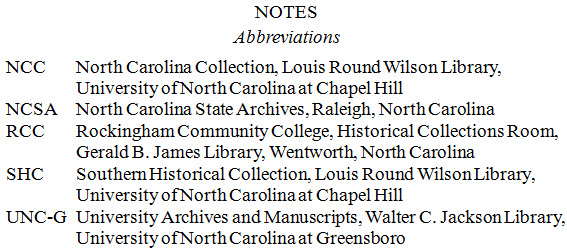
(See Sample 16-11: Endnotes on page 16-30.)
a. Begin each endnote with the print page number. Include the line number as well as the print page number for line-numbered material.
b. Do not insert a reference mark within the text.
c. Do not include braille line numbers in the note section.
a. Create an endnote section at the end of a volume.
b. Move the notes to a separate volume, retaining print page numbers.
a. Devise a key by assigning letters for each label that reflect the meaning of the print label.
b. Do not use numbers as a key for marginal labels.
c. Do not use contractions or letters that comprise short form words as keys for marginal labels.
d. Leave a blank line before and after the list of keyed items.
e. Use 1-3 margins for key items and list them in the order in which the labels occur in the accompanying text. Note: The dot locator for "mention" is not required preceding letters that represent keys.
f. The complete key is enclosed in a transcriber's note. Place the closing transcriber's note indicator following the last item in the list.
g. In the text, insert the assigned key, followed by a space, before the appropriate material. Use braille grouping indicators to enclose the affected text. Explain this usage in a transcriber's note. Sample:
In print, labels appear in the margin of the following letter. In braille, the labels are keyed. The keyed label is inserted before the beginning of the text to which it applies. Labeled phrases or sentences are enclosed in braille grouping indicators.
Symbols used below:
.=< Opening braille grouping indicator.
.=> Closing braille grouping indicator
Key to labels:
ti Title
au Author (last name first)
yb Year of birth
dp Date of publication
pu Publishers
(See Sample 16-12: Marginal Labels on page 16-32 and Sample 16-13: Labeled Letter on page 16-34.)
Sample 16-2: Notes with Headings, page 16-18
Sample 16-3: Sequentially Numbered Notes, page 16-20
Sample 16-4: Two Marked Notes on an Unnumbered Print Line, page 16-21
Sample 16-5: Note with a Quote, page 16-22
Sample 16-6: Repeated Note, page 16-23
Sample 16-7: Continued Note on Next Print Page, page
16-24
Sample 16-8: Notes on Facing Page, page 16-26
Sample 16-9: Note in Column Entry, page 16-27
Sample 16-10: Notes in a Listed Table, page 16-28
Sample 16-11: Endnotes, page 16-30
Sample 16-12: Marginal Labels, page 16-32
Sample 16-13: Labeled Letter, page 16-34
Sample 16-1: Multiple Reference Marks

1⠀"9,,$s4 ,,note,-,orwell 0 writ+ 9 #,-
2⠀⠀⠀#aicf1 :5 ,hitl] & ,/al9 7 9 p[] & ,_w
3⠀⠀⠀,w> ,,ii 0 only ?ree ye>s away4
4⠀"9"9,,$s4 ,,note,-.1,raj3 sov]eignty4
5⠀"9"9"9,,$s4 ,,note,-,f "t immemorial4
6⠀@,?,,$s4 ,,note,-,9 t]roriz+ hm4
7⠀@,],,$s4 ,,note,-,t is1 g"o 9to an
8⠀⠀⠀uncontrollable fr5zy4
Sample 16-2: Notes with Headings
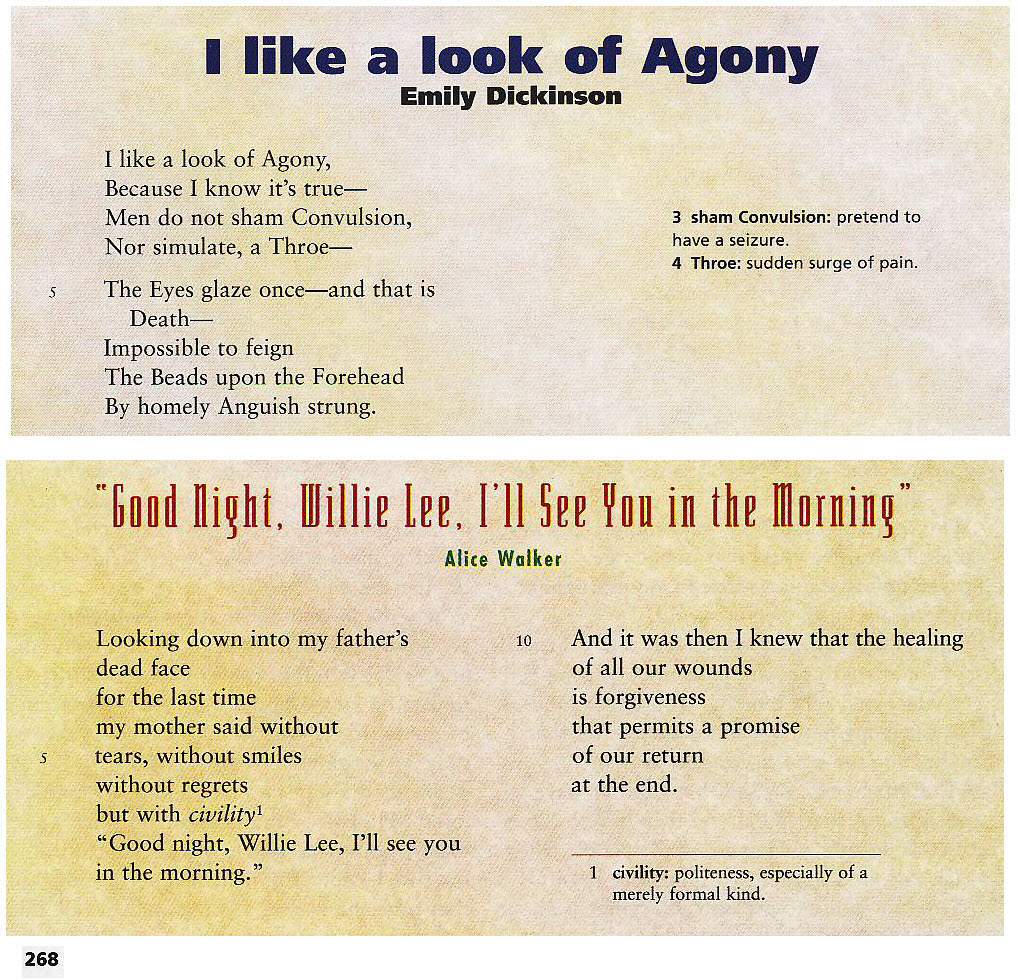
1⠀⠀⠀⠀⠀⠀⠀⠀⠀⠀⠀,i l a look ( ,agony #bfh
2⠀⠀⠀⠀⠀⠀⠀⠀⠀⠀⠀⠀⠀⠀⠀⠀⠀⠀⠀⠀⠀⠀⠀⠀⠀⠀⠀⠀⠀⠀⠀⠀⠀⠀⠀⠀⠀⠀⠀⠀⠀
3⠀⠀⠀⠀⠀⠀⠀⠀⠀⠀⠀⠀⠀,emily ,dick9son
4⠀⠀⠀⠀⠀⠀⠀⠀⠀⠀⠀⠀⠀⠀⠀⠀⠀⠀⠀⠀⠀⠀⠀⠀⠀⠀⠀⠀⠀⠀⠀⠀⠀⠀⠀⠀⠀⠀⠀⠀⠀
5⠀,i l a look ( ,agony1
6⠀,2c ,i "k x's true,-
7⠀,m5 d n %am ,3vul.n1 @.<note@.>
8⠀,nor simulate1 a ,?roe,- @.<note@.>
9⠀⠀⠀⠀⠀⠀⠀⠀⠀⠀⠀⠀⠀⠀⠀⠀⠀⠀⠀⠀⠀⠀⠀⠀⠀⠀⠀⠀⠀⠀⠀⠀⠀⠀⠀⠀⠀⠀⠀⠀⠀
10⠀,! ,eyes glaze once,-& t is ,d1?,- #e
11 444
12 ⠀⠀⠀⠀⠀⠀⠀⠀⠀⠀⠀⠀⠀⠀⠀⠀⠀⠀⠀⠀⠀⠀⠀⠀⠀⠀⠀⠀⠀⠀⠀⠀⠀⠀⠀⠀⠀⠀⠀⠀
13 ⠀⠀⠀⠀⠀⠀⠀8,gd ,ni<t1 ,willie ,lee1
14 ⠀⠀⠀⠀⠀⠀⠀,i'll ,see ,y 9 ! ,morn+0
15 ⠀⠀⠀⠀⠀⠀⠀⠀⠀⠀⠀⠀⠀⠀⠀⠀⠀⠀⠀⠀⠀⠀⠀⠀⠀⠀⠀⠀⠀⠀⠀⠀⠀⠀⠀⠀⠀⠀⠀⠀
16 ⠀⠀⠀⠀⠀⠀⠀⠀⠀⠀⠀⠀⠀,alice ,walk]
17 ⠀⠀⠀⠀⠀⠀⠀⠀⠀⠀⠀⠀⠀⠀⠀⠀⠀⠀⠀⠀⠀⠀⠀⠀⠀⠀⠀⠀⠀⠀⠀⠀⠀⠀⠀⠀⠀⠀⠀⠀
18 ,look+ d[n 9to my "f's
19 444
20 te>s1 )\t smiles #e
21 )\t regrets
22 b ) .1civil;y;9#a
23 444
—New Braille Page—
1⠀"333333 a#bfh2⠀⠀⠀⠀⠀,i l a look ( ,agony
3⠀#c ^1%am ^1,3vul.n3 pret5d to h a
4⠀⠀⠀seizure4
5⠀#d ^1,?roe3 sudd5 surge ( pa94
6⠀⠀⠀⠀⠀⠀⠀⠀⠀⠀⠀⠀⠀⠀⠀⠀⠀⠀⠀⠀⠀⠀⠀⠀⠀⠀⠀⠀⠀⠀⠀⠀⠀⠀⠀⠀⠀⠀⠀⠀⠀
7⠀⠀⠀⠀⠀8,gd ,ni<t1 ,willie ,lee1 ,i'll ,see
8⠀⠀⠀⠀⠀,y 9 ! ,morn+0
9⠀#a ^1civil;y3 polite;s1 especially 444
Sample 16-3: Sequentially Numbered Notes

15 ⠀⠀,to my ,"l's;9#a 9 ! morn+1 ": ,i met
16 ) ,capta9 ,cutt.e4 ,b my ,"l n 2+ up1 ,i
17 w5t \ to ,*>+ ,cross to see ,major
18 ,g5]al ,h>rison;9#b hang$1 drawn1 &
19 qu>t]$,-: 0 d"o "!,-he look+ z *e];lly z
20 any man cd d 9 t 3di;n4 444
21 "333333
22 #a4 ^1my ^1,"l's3 ,$w>d ,montagu
23 ⠀⠀"<#afbe-#afgb">1 e>l ( ,s&wi*2 he 0 a
24 ⠀⠀c\s9 ( ,pepys & 8 sup]ior at ! ,naval
25 ⠀⠀,(fice4 #,-
—New Braille Page—
1⠀#b4 ^1,h>rison3 ,?omas ,h>rison b#edd2⠀⠀⠀"<#afjf-#affj">1 "o ( ! p responsible
3⠀⠀⠀= ! execu;n ( ,k+ ,*>les ,i 9 #afdi4
4⠀------------------------------------#ede
5⠀444
Sample 16-4: Two Marked Notes on an Unnumbered Print Line

1⠀,ha? 9 ! skirts ( ,norway "h & "! #,-
2⠀,%>k'd up;9"0 a li/ ( law.s
3⠀⠀⠀resolutes1;9"0
4⠀,= food & diet1;9"0 to "s 5t]prise
5⠀,t ha? a /oma* 9't2 : is no o!r
6⠀444
7⠀"333333
8⠀^1,%>k'd ^1up ,got tgr 9 haphaz>d
9⠀⠀⠀fa%ion2
10 ^1resolutes ,desp]adoes4
11 ^7food & diet^' ,no pay b _! keep4
12 ------------------------------------#bii
13 444
Sample 16-5: Note with a Quote
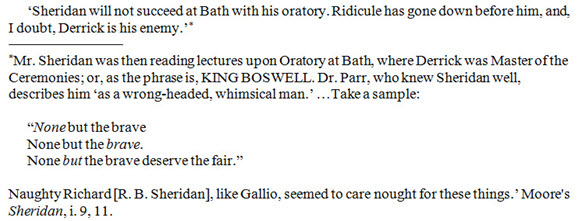
1⠀⠀⠀,8,%]idan w n su3e$ at ,ba? ) 8 a#,-
2⠀oratory4 ,ridicule has g"o d[n 2f hm1 &1
3⠀,i d\bt1 ,d]rick is 8 5emy4,0"9
4⠀"333333
5⠀"9,mr4 ,%]idan 0 !n r1d+ lectures ^u
6⠀⠀⠀,oratory at ,ba?1 ": ,d]rick 0 ,ma/] (
7⠀⠀⠀! ,c]emonies2 or1 z ! phrase is1 ,,k+
8⠀⠀⠀,,boswell4 ,dr4 ,p>r1 :o knew ,%]idan
9⠀⠀⠀well1 describes hm ,8z a wr;g-h1d$1
10 ⠀⠀:imsical man4,0 444 ,take a sample3
11 ⠀⠀⠀⠀⠀⠀⠀⠀⠀⠀⠀⠀⠀⠀⠀⠀⠀⠀⠀⠀⠀⠀⠀⠀⠀⠀⠀⠀⠀⠀⠀⠀⠀⠀⠀⠀⠀⠀⠀⠀
12 ⠀⠀⠀⠀8.1,n"o b ! brave
13 ⠀⠀⠀⠀,n"o b ! .1brave4
14 ⠀⠀⠀⠀,n"o .1b ! brave des]ve ! fair40
15 ⠀⠀⠀⠀⠀⠀⠀⠀⠀⠀⠀⠀⠀⠀⠀⠀⠀⠀⠀⠀⠀⠀⠀⠀⠀⠀⠀⠀⠀⠀⠀⠀⠀⠀⠀⠀⠀⠀⠀⠀
16 ⠀⠀⠀⠀,nau<ty ,ri*>d .<;,r4 ;,b4
17 ⠀⠀,%]idan.>1 l ,gallio1 seem$ to c>e n"\
18 ⠀⠀= ^! ?+s4,0 ,moore's .1,%]idan1 i4 #i1
19 ⠀⠀#aa4
Sample 16-6: Repeated Note
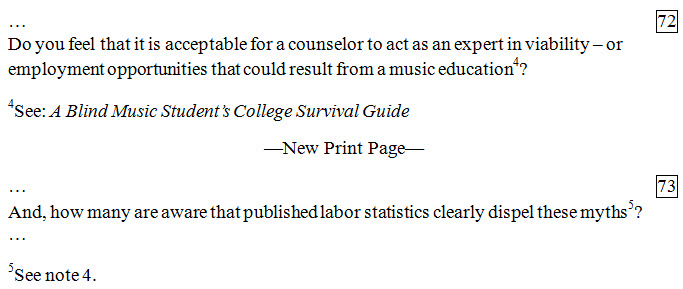
1⠀444 #gb
2⠀,d y feel t x is a3eptable = a c\nselor
3⠀to act z an exp]t 9 viabil;y,-or
4⠀employ;t opportunities t cd result f a
5⠀music $uca;n;9#d8
6⠀"333333
7⠀;9#d,see3 .7,a ,bl ,music ,/ud5t's
8⠀⠀⠀,college ,survival ,guide.'
9⠀-------------------------------------#gc
10 444
11 ,&1 h[ _m >e aw>e t publi%$ labor
12 /ati/ics cle>ly 4pel ^! my?s;9#e8
13 444
14 "333333
15 ;9#e,see note #d4
16 ⠀⠀;9#d,see3 .7,a ,bl ,music ,/ud5t's
17 ⠀⠀⠀⠀,college ,survival ,guide.'
Sample 16-7: Continued Note on Next Print Page
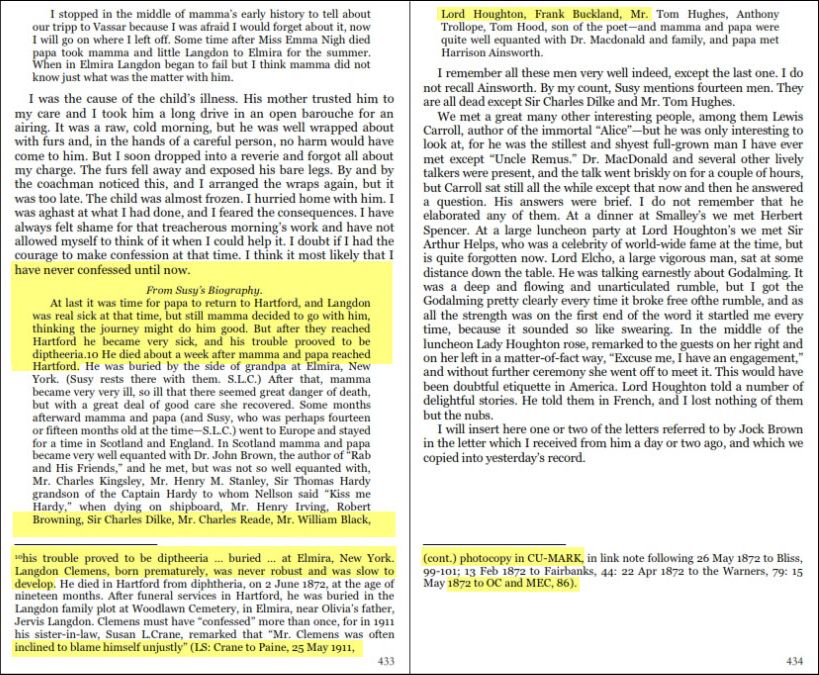
1⠀444 n"e 3fess$ until n[4 a#dcc
2⠀⠀⠀⠀⠀⠀⠀⠀⠀⠀⠀⠀⠀⠀⠀⠀⠀⠀⠀⠀⠀⠀⠀⠀⠀⠀⠀⠀⠀⠀⠀⠀⠀⠀⠀⠀⠀⠀⠀⠀⠀
3⠀⠀⠀⠀⠀⠀⠀⠀⠀⠀,f ,susy's ,biography4
4⠀⠀⠀⠀⠀⠀⠀⠀⠀⠀⠀⠀⠀⠀⠀⠀⠀⠀⠀⠀⠀⠀⠀⠀⠀⠀⠀⠀⠀⠀⠀⠀⠀⠀⠀⠀⠀⠀⠀⠀⠀
5⠀⠀⠀⠀⠀,at la/ x 0 "t = papa to return to
6⠀⠀⠀,h>t=d1 & ,langdon 0 r1l sick at t "t1
7⠀⠀⠀b / mamma decid$ to g ) hm1 ?9k+ !
8⠀⠀⠀j\rney mi<t d hm gd4 ,b af !y r1*$
9⠀⠀⠀,h>t=d he 2came v sick1 & 8 tr\ble
10 ⠀⠀proov$ to 2 dip!]ia4#aj ,he di$ ab a
11 ⠀⠀week af mamma & papa r1*$ ,h>t=d4 444
12 ⠀⠀,br[n+1 ,sir ,*>les ,dilke1 ,mr4
13 ⠀⠀,*>les ,r1de1 ,mr4 ,william ,black1
14 "333333
15 ;9#aj;his tr\ble prov$ to 2 dip!]ia 444
16 ⠀⠀buri$ 444 at ,elmira1 ,new ,york4
17 ⠀⠀,langdon ,clem5s1 born prematurely1 0
18 ⠀⠀n"e robu/ & 0 sl[ to develop4 444
19 ⠀⠀9cl9$ to blame hmf unju/ly0 "<,,ls3
20 ⠀⠀,crane to ,pa9e1 #be ,may #aiaa1
21 ⠀⠀photocopy 9 ,,cu-,,m>k1 444 #ahgb to
22 ⠀⠀,,oc & ,,mec1 #hf">4
23 ⠀⠀⠀⠀⠀⠀⠀⠀⠀⠀⠀⠀⠀⠀⠀⠀⠀⠀⠀⠀⠀⠀⠀⠀⠀⠀⠀⠀⠀⠀⠀⠀⠀⠀⠀⠀⠀⠀⠀⠀
24 ------------------------------------#dcd
25 ⠀⠀,"l ,h"\on1 ,frank ,buckl&1 ,mr4 444
Sample 16-8: Notes on Facing Page
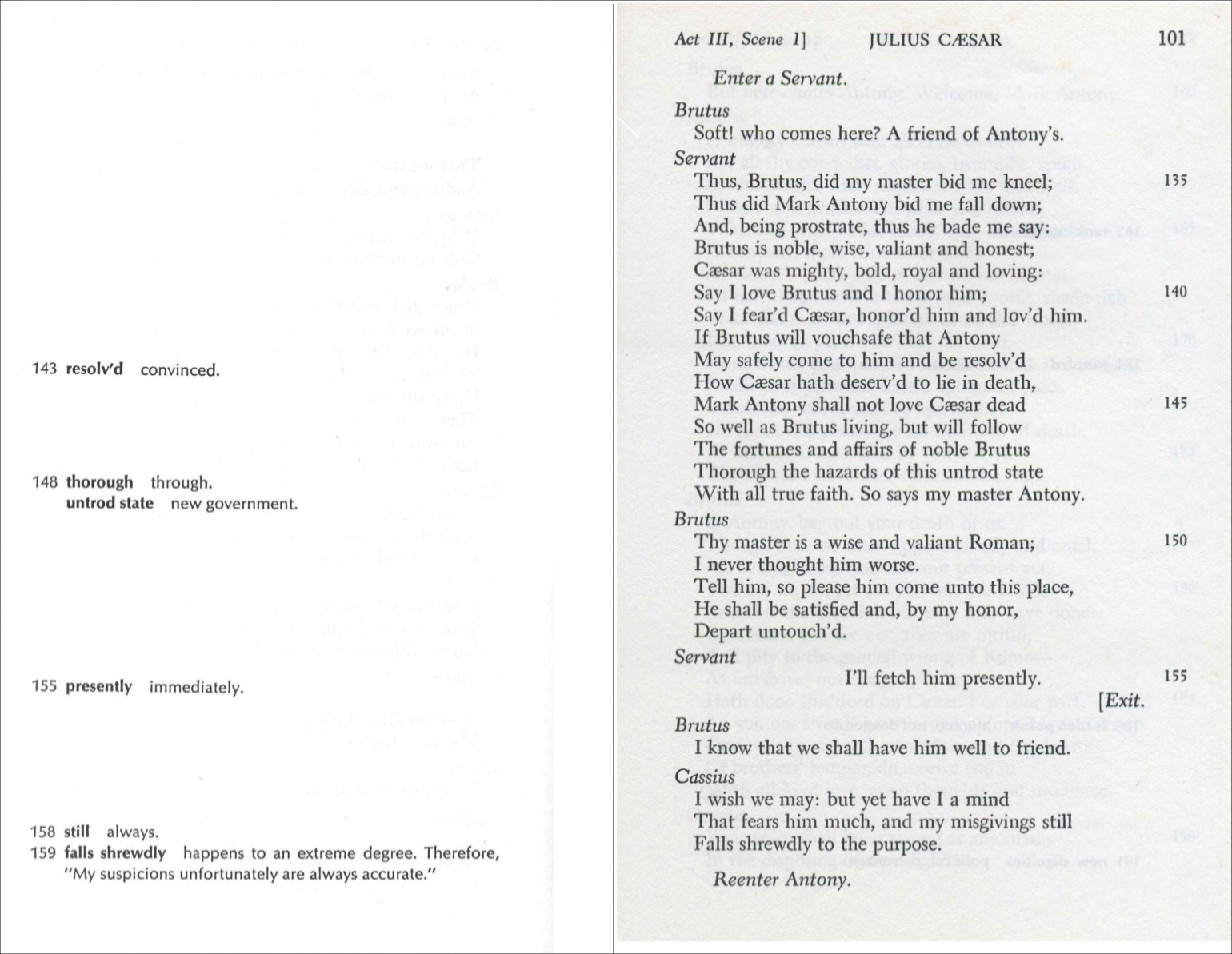
20 ⠀⠀⠀⠀⠀⠀,re5t] ,antony4
21 "333333
22 #adc ^1resolv'd 3v9c$4
23 444
24 #aei ^1falls ^1%rewdly happ5s to an
25 ⠀⠀extreme degree4 ,"!=e1 8,my #,-
—New Braille Page—
1⠀⠀⠀suspicions un=tunately >e b#ajj-#aja2⠀⠀⠀alw a3urate40
Sample 16-9: Note in Column Entry
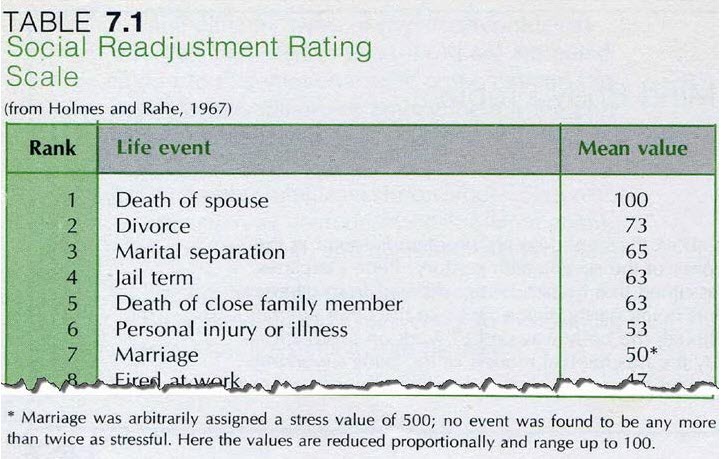
1⠀⠀⠀⠀⠀⠀⠀⠀⠀⠀⠀⠀⠀⠀⠀,,table #g4a #,-
2⠀⠀⠀⠀⠀,social ,readju/;t ,rat+ ,scale
3⠀⠀⠀⠀⠀⠀⠀"<f ,holmes & ,rahe1 #aifg">
4⠀⠀⠀⠀⠀⠀⠀⠀⠀⠀⠀⠀⠀⠀⠀⠀⠀⠀⠀⠀⠀⠀⠀⠀⠀⠀⠀⠀⠀⠀⠀⠀⠀⠀⠀⠀⠀⠀⠀⠀⠀
5⠀⠀⠀⠀⠀⠀⠀@.<,note to table 5try4@.>
6⠀⠀⠀⠀⠀⠀⠀⠀⠀⠀⠀⠀⠀⠀⠀⠀⠀⠀⠀⠀⠀⠀⠀⠀⠀⠀⠀⠀⠀⠀⠀⠀⠀⠀⠀⠀⠀⠀⠀⠀⠀
7⠀"9 ,m>riage 0 >bitr>ily assign$ a /ress
8⠀⠀⠀value ( #ejj2 444
9⠀⠀⠀⠀⠀⠀⠀⠀⠀⠀⠀⠀⠀⠀⠀⠀⠀⠀⠀⠀⠀⠀⠀⠀⠀⠀⠀⠀⠀⠀⠀⠀⠀⠀⠀⠀⠀⠀⠀⠀⠀
10 ⠀⠀⠀⠀⠀⠀⠀⠀⠀⠀⠀⠀⠀⠀⠀⠀⠀⠀⠀⠀⠀⠀⠀⠀⠀⠀⠀⠀⠀⠀⠀⠀⠀⠀,m1n
11 ,rank ,life ev5t value
12 "3333 "333333333333333333333333 "33333
13 #a "" ,d1? ( sp\se """""""""""" #ajj
14 #b "" ,divorce """""""""""""""" #gc
15 #c "" ,m>ital sep>a;n """"""""" #fe
16 #d "" ,jail t]m """"""""""""""" #fc
17 #e "" ,d1? ( close family memb] #fc
18 #f "" ,p]sonal 9jury or ill;s #ec
19 #g "" ,m>riage """""""""""""""" #ej"9
20 444
Sample 16-10: Notes in a Listed Table

1⠀⠀⠀⠀⠀⠀⠀⠀⠀⠀⠀⠀,ma9 ,products ( ! #,-
2⠀⠀⠀⠀⠀⠀⠀⠀⠀⠀⠀⠀⠀⠀⠀,_w's ,m9es
3⠀7777777777777777777777777777777777777777
4⠀⠀⠀⠀⠀⠀⠀@.<,key3
5⠀⠀⠀⠀⠀⠀⠀⠀⠀⠀⠀⠀⠀⠀⠀⠀⠀⠀⠀⠀⠀⠀⠀⠀⠀⠀⠀⠀⠀⠀⠀⠀⠀⠀⠀⠀⠀⠀⠀⠀⠀
6⠀,annual3 ,,annual ,,produc;n"9
7⠀,produc]s3 ,,l1d+ ,,produc]s "<.0
8⠀⠀⠀,,total">@.>
9⠀⠀⠀⠀⠀⠀⠀"9#a1jjj ,metric tons
10 ⠀⠀⠀⠀⠀⠀⠀⠀⠀⠀⠀⠀⠀⠀⠀⠀⠀⠀⠀⠀⠀⠀⠀⠀⠀⠀⠀⠀⠀⠀⠀⠀⠀⠀⠀⠀⠀⠀⠀⠀
11 ⠀⠀⠀⠀⠀⠀⠀⠀⠀⠀⠀⠀,preci\s ,metals
12 ⠀⠀⠀⠀⠀⠀⠀⠀⠀⠀⠀⠀⠀⠀⠀⠀⠀⠀⠀⠀⠀⠀⠀⠀⠀⠀⠀⠀⠀⠀⠀⠀⠀⠀⠀⠀⠀⠀⠀⠀
13 ⠀⠀⠀⠀,,product3 silv]
14 ,annual3 #af
15 ,produc]s3 ,mexico "<#ae.0">1 ,u4,s4
16 ⠀⠀"<#ab.0">
17 ⠀⠀⠀⠀⠀⠀⠀⠀⠀⠀⠀⠀⠀⠀⠀⠀⠀⠀⠀⠀⠀⠀⠀⠀⠀⠀⠀⠀⠀⠀⠀⠀⠀⠀⠀⠀⠀⠀⠀⠀
18 ⠀⠀⠀⠀,,product3 gold
19 ,annual3 #b
20 ,produc]s3 ,s\? ,africa "<#bh.0">1
21 ⠀⠀,u4,s4 "<#ad.0">
—New Braille Page—
1⠀⠀⠀⠀⠀,,product3 plat9um a#,-2⠀,annual3 #j4c
3⠀ ,produc]s3 ,s\? ,africa "<#ej.0">1
4⠀ ⠀⠀,russia "<#db.0">
5⠀⠀⠀⠀⠀⠀⠀⠀⠀⠀⠀⠀⠀⠀⠀⠀⠀⠀⠀⠀⠀⠀⠀⠀⠀⠀⠀⠀⠀⠀⠀⠀⠀⠀⠀⠀⠀⠀⠀⠀⠀
6⠀⠀⠀⠀⠀⠀⠀⠀⠀⠀⠀⠀⠀⠀,fossil ,fuels
7⠀⠀⠀⠀⠀⠀⠀⠀⠀⠀⠀⠀⠀⠀⠀⠀⠀⠀⠀⠀⠀⠀⠀⠀⠀⠀⠀⠀⠀⠀⠀⠀⠀⠀⠀⠀⠀⠀⠀⠀⠀
8⠀⠀⠀⠀⠀,,product3 coal
9⠀,annual3 #d1fjj1jjj
10⠀,produc]s3 ,*9a "<#bd.0">1 ,u4,s4
11 ⠀⠀"<#bj.0">
12 ⠀⠀⠀⠀⠀⠀⠀⠀⠀⠀⠀⠀⠀⠀⠀⠀⠀⠀⠀⠀⠀⠀⠀⠀⠀⠀⠀⠀⠀⠀⠀⠀⠀⠀⠀⠀⠀⠀⠀⠀
13 ⠀⠀⠀⠀,,product3 petroleum
14 ,annual3 #c1jjj1jjj
15 ,produc]s3 ,russia "<#ae.0">1 ,saudi
16 ⠀⠀,>abia "<#ac.0">
17 ⠀⠀⠀⠀⠀⠀⠀⠀⠀⠀⠀⠀⠀⠀⠀⠀⠀⠀⠀⠀⠀⠀⠀⠀⠀⠀⠀⠀⠀⠀⠀⠀⠀⠀⠀⠀⠀⠀⠀⠀
18 ⠀⠀⠀⠀,,product3 natural gas
19 ,annual3 #b1jjj1jjj"9"9
20 ⠀⠀⠀⠀⠀⠀"9"9,cubic met]s
21 ,produc]s3 ,russia "<#ca.0">1 ,u4,s4
22 ⠀⠀"<#bd.0">
23 gggggggggggggggggggggggggggggggggggggggg
24 ⠀⠀⠀⠀⠀⠀⠀⠀⠀⠀⠀⠀⠀⠀⠀⠀⠀⠀⠀⠀⠀⠀⠀⠀⠀⠀⠀⠀⠀⠀⠀⠀⠀⠀⠀⠀⠀⠀⠀⠀
Sample 16-11: Endnotes
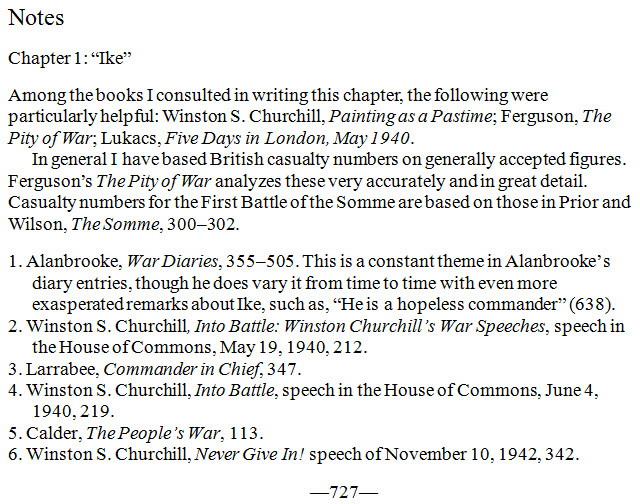
1⠀⠀⠀⠀⠀⠀⠀⠀⠀⠀⠀⠀⠀⠀⠀⠀⠀⠀,notes #gbg
2⠀⠀⠀⠀⠀⠀⠀⠀⠀⠀⠀⠀⠀⠀⠀⠀⠀⠀⠀⠀⠀⠀⠀⠀⠀⠀⠀⠀⠀⠀⠀⠀⠀⠀⠀⠀⠀⠀⠀⠀⠀
3⠀⠀⠀⠀⠀,*apt] #a3 8,ike0
4⠀,am;g ! books ,i 3sult$ 9 writ+ ? *apt]1
5⠀! foll[+ 7 "picul>ly help;l3 444
6⠀⠀⠀444
7⠀⠀⠀⠀⠀⠀⠀⠀⠀⠀⠀⠀⠀⠀⠀⠀⠀⠀⠀⠀⠀⠀⠀⠀⠀⠀⠀⠀⠀⠀⠀⠀⠀⠀⠀⠀⠀⠀⠀⠀⠀
8⠀#a4 ,alanbrooke1 .1,w> .1,di>ies1
9⠀⠀⠀#cee-#eje4 ,? is a 3/ant !me 9
10 ⠀⠀,alanbrooke's di>y 5tries1 ?\< he does
11 ⠀⠀v>y x f "t to "t ) ev5 m exasp]at$
12 ⠀⠀rem>ks ab ,ike1 s* z1 8,he is a hope.s
13 ⠀⠀comm&]0 "<#fch">4
14 #b4 ,w9/on ;,s4 ,*ur*ill1 .7,9to
15 ⠀⠀,battle3 ,w9/on ,*ur*ill's ,w>
16 ⠀⠀,spee*es1.' spee* 9 ! ,h\se (
17 ⠀⠀,commons1 ,may #ai1 #aidj1 #bab4
18 #c4 ,l>rabee1 .7,comm&] 9 ,*ief1.' #cdg4
19 #d4 ,w9/on ;,s4 ,*ur*ill1 .1,9to
20 ⠀⠀.1,battle1 spee* 9 ! ,h\se ( ,commons1
21 ⠀⠀,june #d1 #aidj1 #bai4
22 #e4 ,cald]1 .7,! ,p's ,w>1.' #aac4
23 #f4 ,w9/on ;,s4 ,*ur*ill1 .7,n"e
24 ⠀⠀,give ,96.' spee* ( ,novemb] #aj1 444
Sample 16-12: Marginal Labels
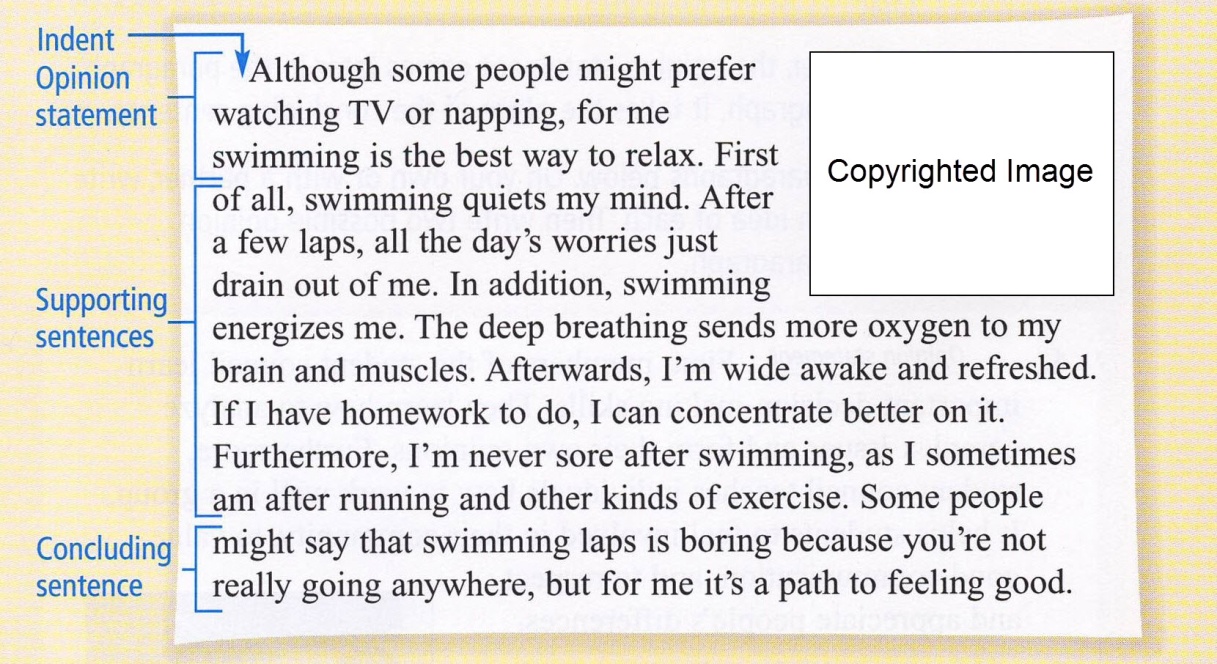
8⠀⠀⠀⠀⠀⠀⠀@.<,! foll[+ p>agraph is m>k$ )
9⠀⠀⠀⠀⠀labels 9 ! m>g94 ,9 brl1 ea* label
10 ⠀⠀⠀⠀is key$4 ,! label is 9s]t$ 2f !
11 ⠀⠀⠀⠀2g9n+ ( ! text to : x applies4
12 ⠀⠀⠀⠀,label$ s5t;es >e 5clos$ 9 brl gr\p+
13 ⠀⠀⠀⠀9dicators4
14 ⠀⠀⠀⠀⠀⠀,symbols us$ 2l3
15 ⠀⠀⠀⠀⠀⠀⠀⠀⠀⠀⠀⠀⠀⠀⠀⠀⠀⠀⠀⠀⠀⠀⠀⠀⠀⠀⠀⠀⠀⠀⠀⠀⠀⠀⠀⠀⠀⠀⠀⠀
16 .=< ,op5+ brl gr\p+ 9dicator
17 .=> ,clos+ brl gr\p+ 9dicator
18 ⠀⠀⠀⠀⠀⠀⠀⠀⠀⠀⠀⠀⠀⠀⠀⠀⠀⠀⠀⠀⠀⠀⠀⠀⠀⠀⠀⠀⠀⠀⠀⠀⠀⠀⠀⠀⠀⠀⠀⠀
19 ⠀⠀⠀⠀⠀⠀,key to labels3
20 ⠀⠀⠀⠀⠀⠀⠀⠀⠀⠀⠀⠀⠀⠀⠀⠀⠀⠀⠀⠀⠀⠀⠀⠀⠀⠀⠀⠀⠀⠀⠀⠀⠀⠀⠀⠀⠀⠀⠀⠀
21 in ,9d5t
22 os ,op9ion /ate;t
23 ss ,support+ s5t;es
24 cs ,3clud+ s5t;e@.>
25 ⠀⠀⠀⠀⠀⠀⠀⠀⠀⠀⠀⠀⠀⠀⠀⠀⠀⠀⠀⠀⠀⠀⠀⠀⠀⠀⠀⠀⠀⠀⠀⠀⠀⠀⠀⠀⠀#,-
—New Braille Page—
1⠀777777777777777777777777777777777 a#,-2⠀⠀⠀in os ;<,al?\< "s p mi<t pref] wat*+
3⠀,,tv or napp+1 = me swimm+ is ! be/ way
4⠀to relax4;> ss ;<,fir/ ( all1 swimm+
5⠀quiets my m9d4 ,af a few laps1 all !
6⠀"d's worries j dra9 \ ( me4 ,9 addi;n1
7⠀swimm+ 5]gizes me4 ,! deep br1?+ s5ds m
8⠀oxyg5 to my bra9 & muscles4 ,afws1 ,i'm
9⠀wide awake & refre%$4 ,if ,i h home"w to
10 d1 ,i c 3c5trate bett] on x4 ,fur!rmore1
11 ,i'm n"e sore af swimm+1 z ,i "s"ts am
12 af runn+ & o!r k9ds ( ex]cise4;>
13 cs ;<,"s p mi<t say t swimm+ laps is
14 bor+ 2c y're n r1lly go+ any":1 b = me
15 x's a pa? to feel+ good4;>
16 gggggggggggggggggggggggggggggggggggggggg
Sample 16-13: Labeled Letter
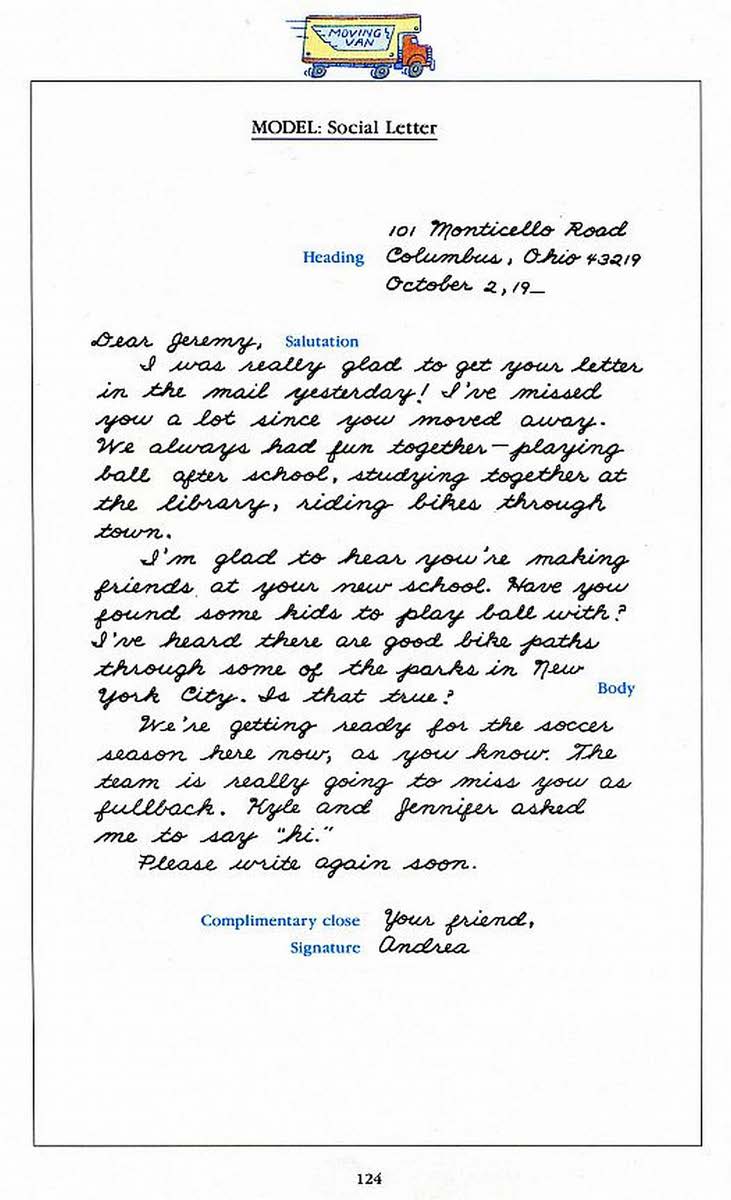
1⠀⠀⠀⠀⠀⠀⠀⠀⠀⠀⠀,,model3 ,social ,lr #abd
2⠀⠀⠀⠀⠀⠀⠀⠀⠀⠀⠀⠀⠀⠀⠀⠀⠀⠀⠀⠀⠀⠀⠀⠀⠀⠀⠀⠀⠀⠀⠀⠀⠀⠀⠀⠀⠀⠀⠀⠀⠀
3⠀⠀⠀⠀⠀⠀⠀@.<,sec;ns ( ! foll[+ lr >e m>k$ )
4⠀⠀⠀⠀⠀labels 9 ! m>g94 ,9 brl1 ea* label
5⠀⠀⠀⠀⠀is key$4 ,! label is 9s]t$ 2f !
6⠀⠀⠀⠀⠀2g9n+ ( ! text to : x applies4
7⠀⠀⠀⠀⠀,label$ phrases >e 5clos$ 9 brl
8⠀⠀⠀⠀⠀gr\p+ 9dicators4
9⠀⠀⠀⠀⠀⠀⠀,symbols us$ 2l3
10 ⠀⠀⠀⠀⠀⠀⠀⠀⠀⠀⠀⠀⠀⠀⠀⠀⠀⠀⠀⠀⠀⠀⠀⠀⠀⠀⠀⠀⠀⠀⠀⠀⠀⠀⠀⠀⠀⠀⠀⠀
11 .=< ,op5+ brl gr\p+ 9dicator
12 .=> ,clos+ brl gr\p+ 9dicator
13 ⠀⠀⠀⠀⠀⠀⠀⠀⠀⠀⠀⠀⠀⠀⠀⠀⠀⠀⠀⠀⠀⠀⠀⠀⠀⠀⠀⠀⠀⠀⠀⠀⠀⠀⠀⠀⠀⠀⠀⠀
14 ⠀⠀⠀⠀⠀⠀,key to labels3
15 ⠀⠀⠀⠀⠀⠀⠀⠀⠀⠀⠀⠀⠀⠀⠀⠀⠀⠀⠀⠀⠀⠀⠀⠀⠀⠀⠀⠀⠀⠀⠀⠀⠀⠀⠀⠀⠀⠀⠀⠀
16 hn ,h1d+
17 sa ,saluta;n
18 bo ,body
19 cl ,compli;t>y close
20 si ,signature@.>
—New Braille Page—
1⠀77777777777777777777777777777777 a#abd2⠀⠀⠀⠀⠀⠀⠀⠀⠀⠀⠀⠀⠀⠀hn ;<#aja ,monticello ,road
3⠀⠀⠀⠀⠀⠀⠀⠀⠀⠀⠀⠀⠀⠀,columbus1 ,ohio #dcbai
4⠀⠀⠀⠀⠀⠀⠀⠀⠀⠀⠀⠀⠀⠀,octob] #b1 #ai,-;>
5⠀⠀⠀⠀⠀⠀⠀⠀⠀⠀⠀⠀⠀⠀⠀⠀⠀⠀⠀⠀⠀⠀⠀⠀⠀⠀⠀⠀⠀⠀⠀⠀⠀⠀⠀⠀⠀⠀⠀⠀⠀
6⠀sa ;<,de> ,j]emy1;>
7⠀⠀⠀bo ;<,i 0 r1lly glad to get yr lr 9 !
8⠀mail ye/]"d6 444
9⠀⠀⠀,i'm glad to he> y're mak+ frs at yr
10 new s*ool4 444
11 ⠀⠀,we're gett+ r1dy = ! so3] s1son "h
12 n[1 z y "k4 444
13 ⠀⠀,pl1se write ag soon4;>
14 ⠀⠀⠀⠀⠀⠀⠀⠀⠀⠀⠀⠀⠀cl ;<,y\r fri5d1;>
15 ⠀⠀⠀⠀⠀⠀⠀⠀⠀⠀⠀⠀⠀si ;<,&rea;>
16 gggggggggggggggggggggggggggggggggggggggg